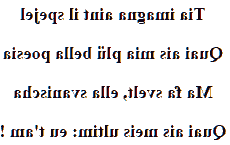Romansh love poem
Spejel
Tia imagna aint il spejel
Quai ais mia plü bella poesia
Ma fa svelt, ella svanischa
Quai ais meis ultim: eu t'am !


→ French poem ←
Romansh language
It missed this European language, I did not think it would be so difficult to find your language. But you were hidden in the forest for a so long time, that it was really difficult to find you. Today 06/15/17 i succeed, and here is your love poem in vallader!.
Romansh (Rheto-Romance, Vallader, Surmiran, Surselva, Romansch, Hinterrhein, Lower Engadine, Vorderrhein, Rumantsch, Albula, Sursilvan, Romanche, Sutsilvan, Rhaeto-Romance, Upper Engadine, Puter) is the language of about 50,000 people, mostly in the canton of Graubünden in Switzerland.
This translation, is exactly into vallader or lower Engadine. The term vallader designating the inhabitants of Lower Engadine, the community of the whole valley, for approximately 5,000 speakers ... And that is in this valley that she lives.
The various Rhaeto-Romanic variants that make up Romansh language (rumantsch grischun) are related to the languages of Northern Italy and make rumantsch, the 4th official language of the Helvetic confederation. Romansh is a language with less and less speakers. Its already small number about 50,000, continues to decline, -17% in 10 years. One can notice in these 4 small translated lines, the resemblances with Italian, Spanish, Portuguese, and French, plus borrowings with the proximity of German Swiss.
The first trace of Romansh, is in a document written in Latin in 1389. A longer text dates from 1527, but there are no more copies. The sixteenth and seventeenth centuries provide us with religious books. They will be the starting point of the four regional forms: Puter, Vallader and Surselvan Catholic and Protestant. The geography that makes contact between regions difficult, is the reason of the development of these dialects. It takes some acclimatization to move from one to the other.
In the constitution of Grisons, Romansh is on an equal footing with Italian and German, whicyh are the two other languages of this canton. If it has not a lot been used in the administration it is mainly because of the non-existence of a written standard. In 1864 and after, attempts to standardize the writing have failed. In 1938, Romansh became a national language.